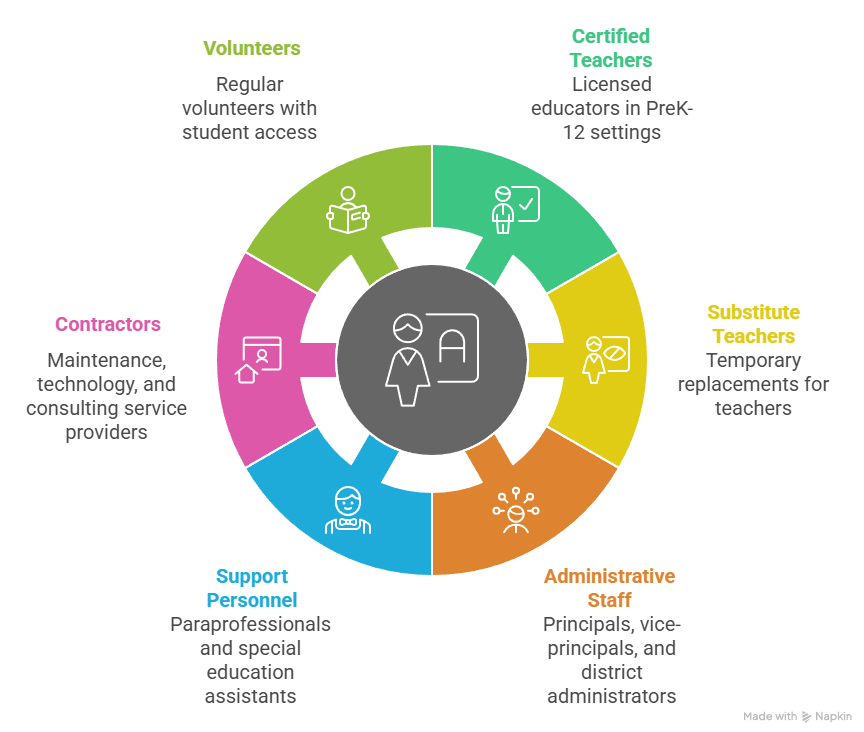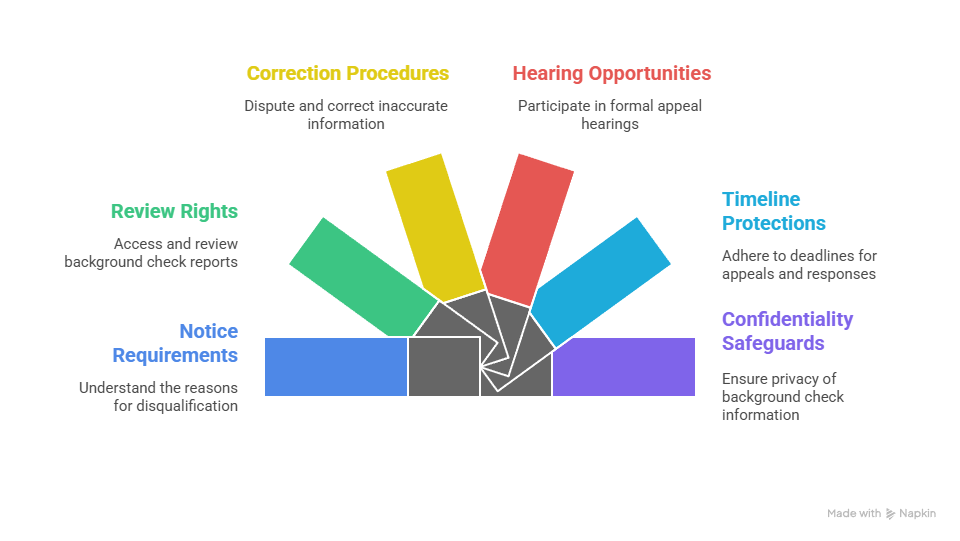Maryland teacher background screening is a comprehensive vetting process mandated by the Maryland State Department of Education that includes criminal history checks, child abuse clearances, and professional reference verification for all education personnel. The screening process has been enhanced in 2025 with updated COMAR regulations requiring digital fingerprinting and expanded federal database searches to ensure student safety.
Key Takeaways
- Maryland education background checks are required for all teachers, substitutes, contractors, and volunteers who work with students in public and private schools.
- The Maryland State Department of Education screening process includes both state and federal criminal history checks through the Criminal Justice Information System.
- COMAR background check procedures require completion within 30 days of employment offer and must be renewed every five years for continuing educators.
- Digital fingerprinting through MorphoTrust or IdentoGO is mandatory as of 2025, replacing the previous ink-and-roll method for all new applications.
- Background screening costs range from $65-85 per individual, with some districts covering expenses for new hires but requiring employee payment for renewals.
- Certain criminal convictions create automatic disqualification, while others undergo individual review by the Professional Standards and Teacher Education Board.
Understanding Maryland Teacher Background Screening Requirements
Maryland's commitment to student safety drives comprehensive background screening requirements for all education personnel. The Maryland State Department of Education mandates these checks under Education Article §6-113 and COMAR 13A.12.02, establishing clear protocols for vetting individuals who work with minors in educational settings. COMAR, which stands for Code of Maryland Regulations, represents the state's official administrative law governing all regulatory procedures including education personnel screening.
The screening process encompasses multiple verification layers designed to identify potential risks to student welfare. Maryland education background checks examine criminal history at both state and federal levels, review child abuse registries, and verify professional credentials and employment history. These requirements apply universally across public school systems, private institutions, charter schools, and approved childcare centers operating within Maryland's jurisdiction.
Recent legislative updates in 2025 have strengthened these protocols significantly. Enhanced database access now includes expanded federal searches and real-time monitoring systems that alert school districts to any subsequent arrests or convictions of current employees. This proactive approach represents a substantial improvement over previous screening methods that relied solely on initial clearance without ongoing monitoring.
What Is COMAR and Its Role in Background Screening
COMAR, the Code of Maryland Regulations, serves as the comprehensive collection of administrative rules that govern how state agencies implement statutory requirements. For education personnel screening, COMAR Title 13A provides the detailed regulatory framework that translates legislative mandates into specific operational procedures. These regulations carry the force of law and establish binding requirements for all educational institutions operating within Maryland.
The regulatory authority of COMAR extends beyond simple policy guidance to create enforceable standards with specific penalties for non-compliance. School districts, private schools, and educational contractors must adhere to COMAR background check procedures or face potential sanctions including loss of state funding, accreditation issues, or legal liability. This regulatory structure ensures consistent application of safety standards across all educational environments regardless of size or organizational type.
COMAR regulations undergo periodic review and update to address emerging threats and best practices in educational safety. The 2025 updates to COMAR 13A.12.02 reflect contemporary understanding of background screening effectiveness and incorporate technological improvements that enhance both accuracy and efficiency. These regulatory changes demonstrate Maryland's commitment to maintaining cutting-edge student protection measures.
Who Needs Maryland Teacher Background Screening
Required Personnel Categories
Maryland teacher screening requirements extend beyond traditional classroom educators to encompass all individuals with student contact opportunities. Teachers, substitute teachers, paraprofessionals, administrators, and support staff must complete full background screening before beginning employment. Additionally, contractors, volunteers, and student teachers require clearance regardless of their anticipated duration of service.
The scope includes both direct and indirect student contact roles, recognizing that school safety depends on comprehensive vetting of all personnel. Bus drivers, cafeteria workers, maintenance staff, and after-school program coordinators must undergo identical screening processes. This broad application ensures consistent safety standards across all school operations and eliminates potential security gaps.

- Certified Teachers: All licensed educators in PreK-12 settings
- Substitute Teachers: Both long-term and short-term replacements
- Administrative Staff: Principals, vice-principals, and district administrators
- Support Personnel: Paraprofessionals, aides, and special education assistants
- Contractors: Maintenance, technology, and consulting service providers
- Volunteers: Regular volunteers with unsupervised student access
Exemptions and Special Cases
Limited exemptions exist for specific circumstances, though these have been significantly reduced in 2025 regulations. Emergency substitute teachers may receive temporary 30-day conditional clearance while background checks process, provided they maintain supervised contact with students. Licensed professionals conducting one-time presentations or performances may qualify for abbreviated screening if accompanied by cleared school personnel throughout their visit.
Out-of-state educators transferring to Maryland must complete full screening regardless of previous clearances in other jurisdictions. Federal employees and military personnel are not exempt from state requirements, though their existing security clearances may expedite certain portions of the review process. These provisions ensure consistent standards while accommodating legitimate operational needs.
COMAR Background Check Procedures Step-by-Step
COMAR background check procedures follow a structured timeline designed to balance thoroughness with operational efficiency. The process begins when school districts or employers initiate screening requests through the Maryland State Department of Education's online portal, providing applicant information and position details. COMAR regulations specify exact documentation requirements and processing standards that ensure consistency across all applications.
Applicants receive electronic notification with specific instructions for completing their portion of the screening process. This includes scheduling fingerprinting appointments, submitting required documentation, and authorizing background check releases. The streamlined digital system implemented in 2025 reduces processing delays and provides real-time status updates to both applicants and employers.
Processing typically completes within 10-15 business days for standard applications, though complex cases requiring additional review may extend to 30 days. Expedited processing is available for emergency situations at additional cost, reducing timelines to 3-5 business days for urgent staffing needs.
| Step | Timeline | Responsibility | Action Required |
| Application Submission | Day 1 | Employer | Submit screening request via MSDE portal |
| Fingerprinting Appointment | Days 2-5 | Applicant | Schedule and complete digital fingerprinting |
| Documentation Review | Days 6-10 | MSDE | Process criminal history and registry checks |
| Results Notification | Days 11-15 | System | Automated notification to employer and applicant |
The enhanced procedures now include automated cross-referencing with national databases and integration with professional licensing boards. This comprehensive approach provides employers with complete risk assessments while maintaining applicant privacy protections required under federal and state regulations.
Required Documentation and Fingerprinting Process
Essential Documents Checklist
Maryland teacher background screening requires specific documentation to verify identity and authorize comprehensive background checks. Applicants must provide government-issued photo identification, Social Security card or verification, and completed background check authorization forms. Additionally, out-of-state applicants must submit clearances from all previous states of residence within the past seven years.
Professional credentials including teaching certificates, transcripts, and employment verification letters support the screening process. These documents help verify claimed experience and identify any discrepancies requiring additional investigation. The documentation requirements ensure thorough vetting while providing applicants clear guidance on submission expectations.

- Primary Identification: Valid driver's license or state ID card
- Secondary Identification: Social Security card, passport, or birth certificate
- Authorization Forms: Completed background check release and consent documents
- Professional Credentials: Teaching certificates, licenses, and educational transcripts
- Previous Clearances: Out-of-state background checks from past seven years
- Employment History: Verification letters from previous educational employers
Digital Fingerprinting Requirements
Digital fingerprinting through approved vendors represents the most significant procedural change in 2025 Maryland teacher background screening. MorphoTrust and IdentoGO operate authorized collection sites throughout Maryland, replacing previous ink-based methods with electronic capture systems. This technology improvement enhances accuracy while reducing processing delays common with traditional fingerprinting methods.
Appointments must be scheduled in advance through vendor websites, with availability typically within 3-5 business days in metropolitan areas. Rural locations may require longer wait times, though mobile fingerprinting services are available for districts with multiple applicants. The electronic submission provides immediate confirmation and tracking capabilities for both applicants and school districts.
Criminal History Review and Disqualifying Offenses
Maryland's approach to criminal history evaluation balances public safety with fair employment practices through clearly defined disqualification criteria. The Maryland State Department of Education screening examines convictions rather than arrests, focusing on offenses that directly impact student safety and educational environments. This evidence-based approach provides consistency while allowing individual consideration of unique circumstances.
Automatic disqualification applies to specific serious offenses including violent crimes, sexual offenses, and crimes against children. These restrictions reflect zero-tolerance policies for behaviors that pose direct risks to student welfare. However, less serious offenses undergo individualized review considering factors such as time elapsed, rehabilitation evidence, and job-related relevance.
The review process includes consideration of expungement and pardon status, recognizing legal remedies available to individuals seeking to overcome past mistakes. Professional Standards and Teacher Education Board review panels examine each case thoroughly, providing applicants opportunities to present mitigation evidence and demonstrate rehabilitation.
Automatic Disqualification Offenses
Certain criminal convictions create immediate disqualification from Maryland education positions without individual review options. These include murder, sexual assault, child abuse, kidnapping, and other violent felonies that demonstrate clear risks to student safety. Drug trafficking convictions and domestic violence offenses involving children also result in automatic exclusion.
The list of disqualifying offenses has been expanded in 2025 to include cybercrime convictions involving minors and financial fraud offenses exceeding $10,000. These additions reflect evolving threats to student safety and educational institution integrity in digital environments.
| Offense Category | Examples | Review Type |
| Crimes Against Children | Child abuse, endangerment, exploitation | Automatic Disqualification |
| Sexual Offenses | Sexual assault, indecent exposure, solicitation | Automatic Disqualification |
| Violent Crimes | Murder, assault with deadly weapon, robbery | Automatic Disqualification |
| Drug Trafficking | Distribution, manufacturing, major possession | Automatic Disqualification |
| Financial Crimes | Embezzlement over $10,000, identity theft | Individual Review |
| Property Crimes | Burglary, theft under $10,000, vandalism | Individual Review |
Timeline and Processing Expectations
Standard Maryland teacher background screening processing requires 10-15 business days from complete application submission to final results notification. This timeline assumes all documentation is properly submitted and no complications arise requiring additional investigation. The automated systems implemented in 2025 have reduced average processing times by approximately 30% compared to previous manual review methods.
Complex cases involving out-of-state criminal history, name discrepancies, or incomplete FBI records may extend processing to 20-30 business days. Applicants and employers receive automated status updates throughout the review process, providing transparency and enabling better workforce planning. Emergency processing options are available for critical staffing situations, reducing timelines to 3-5 business days at additional cost.
Seasonal variations affect processing times, with peak demand occurring during summer months as districts prepare for fall semester staffing. Planning ahead and submitting applications early in the hiring process helps avoid delays that could impact employment start dates.
| Processing Type | Standard Timeline | Cost | Best Used For |
| Standard Processing | 10-15 business days | $65-75 | Regular hiring cycles |
| Complex Case Review | 20-30 business days | $75-85 | Out-of-state applicants |
| Expedited Processing | 3-5 business days | $95-110 | Emergency staffing needs |
School districts typically batch process applications to maximize efficiency and reduce costs. Individual applicants should coordinate with their prospective employers to ensure proper timing and avoid unnecessary expedited processing fees.
Costs and Fee Structure for 2025
Maryland education background checks cost between $65-85 per applicant depending on the complexity of required screening components. Standard in-state applicants pay $65 for basic criminal history and registry checks, while out-of-state applicants face additional fees for expanded database searches totaling $75-85. These fees cover both state and federal background check components required for complete clearance.
Fingerprinting services add $15-25 to total costs depending on the collection site location and appointment availability. Rural areas may charge higher fees due to limited service provider competition, while metropolitan areas often offer competitive pricing. Some school districts absorb these costs for new hires but require employees to pay renewal fees every five years.
Payment methods include credit cards, money orders, and electronic transfers for most components. However, fingerprinting vendors may have different payment requirements, and applicants should verify accepted methods when scheduling appointments. Fee assistance programs exist for certain qualifying applicants, though funding is limited and subject to annual appropriations.
Renewal Requirements and Ongoing Compliance
Maryland teacher background screening requires renewal every five years for all continuing education personnel. This periodic rechecking ensures ongoing safety standards while identifying any criminal activity occurring after initial clearance. The renewal process follows similar procedures to initial screening but may be streamlined for employees with clean interim records.
Renewal notifications are sent automatically 60 days before expiration dates, providing adequate time for processing without employment interruption. However, employees remain responsible for tracking their clearance status and initiating renewal procedures promptly. Failure to maintain current clearance results in immediate suspension from duties involving student contact until renewed clearance is obtained.
Enhanced monitoring systems implemented in 2025 provide real-time alerts for arrests or convictions of current employees between renewal periods. This continuous monitoring represents a significant safety improvement over previous systems that relied solely on periodic renewal checks.
| Renewal Component | Frequency | Process | Cost |
| Criminal History Check | Every 5 years | Full re-screening | $45-55 |
| Child Abuse Registry | Every 5 years | Automated update | $10-15 |
| Professional References | Every 5 years | Employer verification | $5-10 |
Employers must maintain accurate records of all employee clearance expiration dates and ensure compliance through systematic tracking systems. Many districts use automated HR software to manage renewal schedules and prevent inadvertent lapses in required clearances.
Appeals Process and Legal Protections
Applicants who receive adverse background check determinations have specific appeal rights under Maryland law and federal Fair Credit Reporting Act provisions. The appeals process allows individuals to contest inaccurate information, provide additional context for criminal history, or demonstrate rehabilitation since previous offenses. This due process protection balances public safety concerns with individual employment rights.
Initial appeals must be filed within 30 days of adverse determination notice, accompanied by supporting documentation such as court records, rehabilitation certificates, or character references. The Professional Standards and Teacher Education Board conducts formal hearings for contested cases, providing applicants opportunities to present evidence and legal representation if desired.
Legal protections include requirements for specific adverse action notices, opportunities to review background check reports, and procedures for correcting inaccurate information. Applicants also have rights to copies of all documents relied upon in making adverse determinations, ensuring transparency in the decision-making process.

- Notice Requirements: Written explanation of specific disqualifying factors
- Review Rights: Access to complete background check reports and source documents
- Correction Procedures: Methods for disputing and correcting inaccurate information
- Hearing Opportunities: Formal appeal hearings with legal representation allowed
- Timeline Protections: Specific deadlines for appeals and responses from reviewing authorities
- Confidentiality Safeguards: Limitations on disclosure of background check information
The appeals process recognizes that background checks sometimes contain errors or fail to reflect complete circumstances surrounding past events. Fair consideration of individual situations helps ensure that qualified candidates are not inappropriately excluded from education careers due to incomplete or inaccurate information.
Conclusion
Maryland teacher background screening serves as a critical safeguard protecting students while providing clear pathways for qualified educators to enter and remain in the profession. The enhanced 2025 requirements reflect evolving best practices in personnel security while maintaining due process protections for applicants. Understanding these requirements helps job seekers navigate the process efficiently and employers maintain compliant hiring practices. With proper preparation and realistic timeline expectations, the background screening process supports both educational quality and student safety throughout Maryland's school systems.
Frequently Asked Questions
How long does Maryland teacher background screening take in 2025?
Standard Maryland teacher background screening takes 10-15 business days from complete application submission. Complex cases involving out-of-state history may require 20-30 days, while expedited processing can reduce timelines to 3-5 business days for emergency situations at additional cost.
What is COMAR and how does it affect teacher background checks?
COMAR stands for Code of Maryland Regulations and represents the state's official administrative law governing regulatory procedures including education personnel screening. COMAR 13A.12.02 specifically establishes binding requirements for all educational institutions conducting background checks, with the force of law and penalties for non-compliance.
What disqualifies someone from teaching in Maryland?
Automatic disqualification offenses include crimes against children, sexual offenses, violent felonies, murder, and drug trafficking convictions. Other criminal history undergoes individual review considering factors like time elapsed, rehabilitation evidence, and job-related relevance by the Professional Standards and Teacher Education Board.
How much does a Maryland education background check cost?
Maryland education background checks cost $65-85 depending on screening complexity, plus $15-25 for digital fingerprinting services. In-state applicants typically pay $65 for standard screening, while out-of-state applicants face $75-85 for expanded database searches.
Do substitute teachers need background checks in Maryland?
Yes, all substitute teachers in Maryland must complete full background screening before employment, including both long-term and short-term substitutes. Emergency situations allow temporary 30-day conditional clearance with supervised student contact while screening processes.
How often must Maryland teachers renew background checks?
Maryland teachers must renew background checks every five years throughout their careers. Renewal notifications are sent 60 days before expiration, and failure to maintain current clearance results in immediate suspension from student contact duties.
Can I appeal a negative Maryland teacher background check?
Yes, applicants have 30 days to appeal adverse determinations through the Professional Standards and Teacher Education Board. Appeals allow individuals to contest inaccurate information, provide additional context, or demonstrate rehabilitation since previous offenses occurred.
What documents are required for Maryland teacher screening?
Required documents include government-issued photo ID, Social Security verification, completed authorization forms, teaching certificates, educational transcripts, and any previous state clearances from the past seven years. Out-of-state applicants must provide clearances from all previous residence states.
Additional Resources
- Maryland State Department of Education Background Screening Portal
https://www.marylandpublicschools.org/about/Pages/DCAA/DBS/index.aspx - COMAR 13A.12.02 - Criminal Background Investigations
https://www.dsd.state.md.us/comar/comarhtml/13a/13a.12.02.htm - MorphoTrust Fingerprinting Services Maryland
https://www.morphotrust.com/maryland - IdentoGO Maryland Fingerprinting Locations
https://www.identogo.com/locations/maryland - Professional Standards and Teacher Education Board Appeals
https://www.marylandpublicschools.org/about/Pages/DCAA/PST/index.aspx - Maryland Education Article §6-113 Background Check Requirements
https://mgaleg.maryland.gov/mgawebsite/Laws/StatuteText?article=ged§ion=6-113 - Fair Credit Reporting Act Rights for Job Applicants
https://www.consumer.ftc.gov/articles/pdf-0096-fair-credit-reporting-act.pdf

GCheck Editorial Team
Meet the GCheck Editorial Team, your trusted source for insightful and up-to-date information in the world of employment background checks. Committed to delivering the latest trends, best practices, and industry insights, our team is dedicated to keeping you informed.
With a passion for ensuring accuracy, compliance, and efficiency in background screening, we are your go-to experts in the field. Stay tuned for our comprehensive articles, guides, and analysis, designed to empower businesses and individuals with the knowledge they need to make informed decisions.
At GCheck, we're here to guide you through the complexities of background checks, every step of the way.





